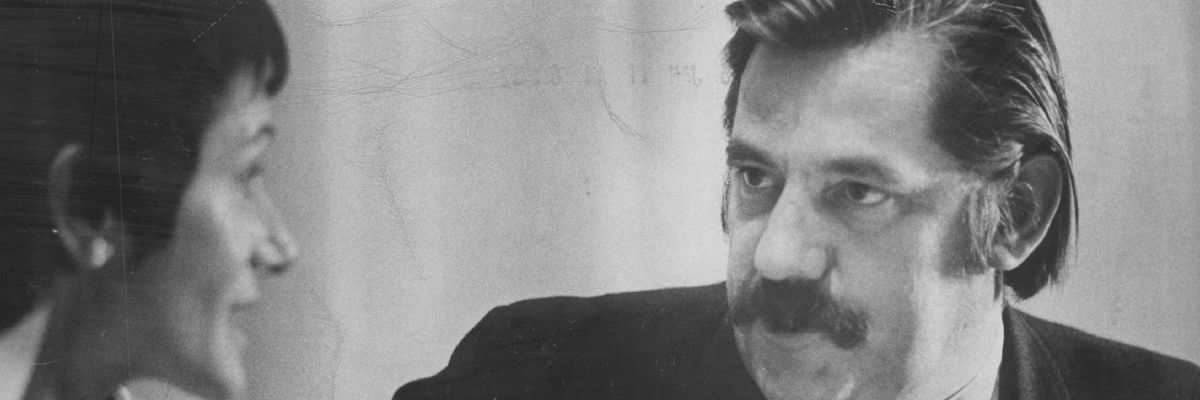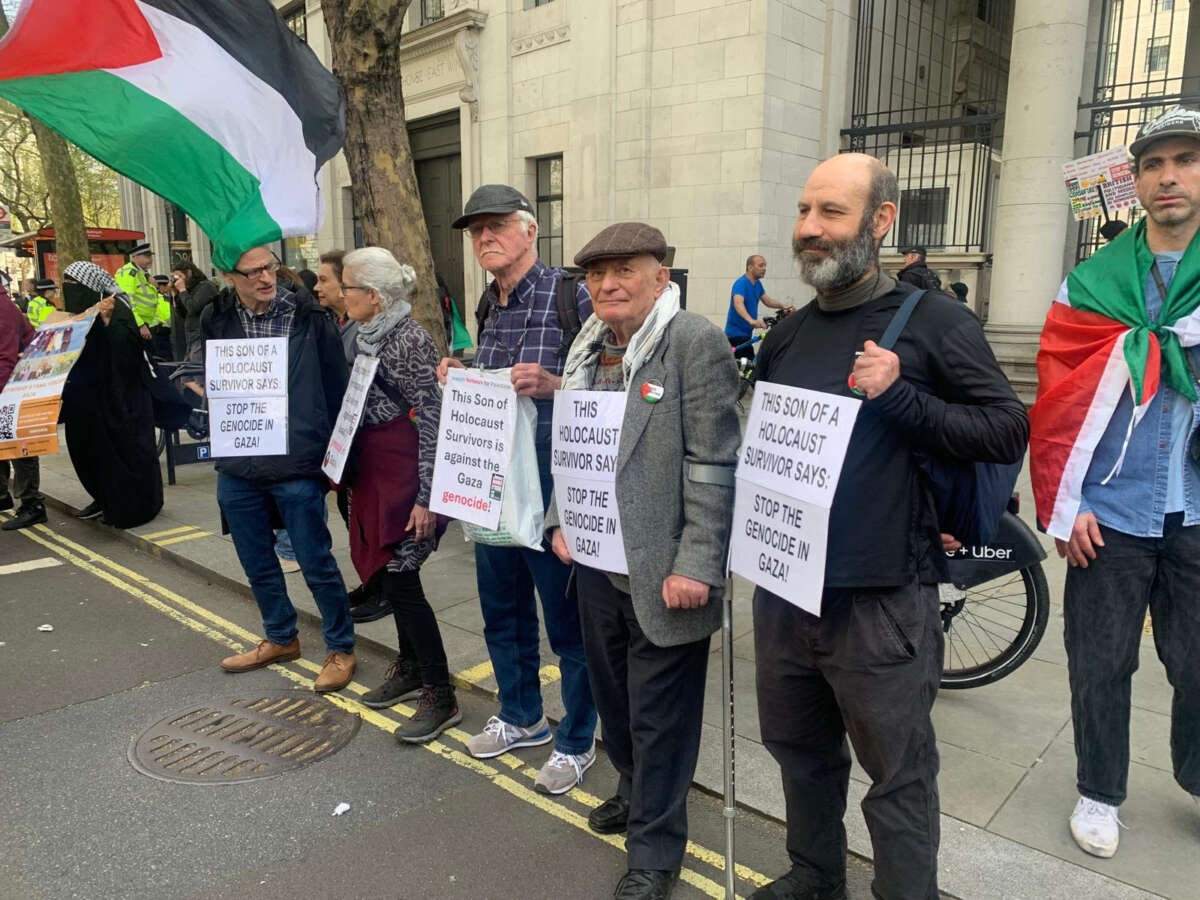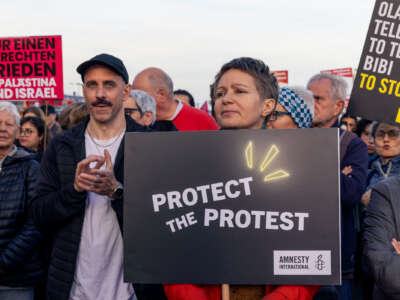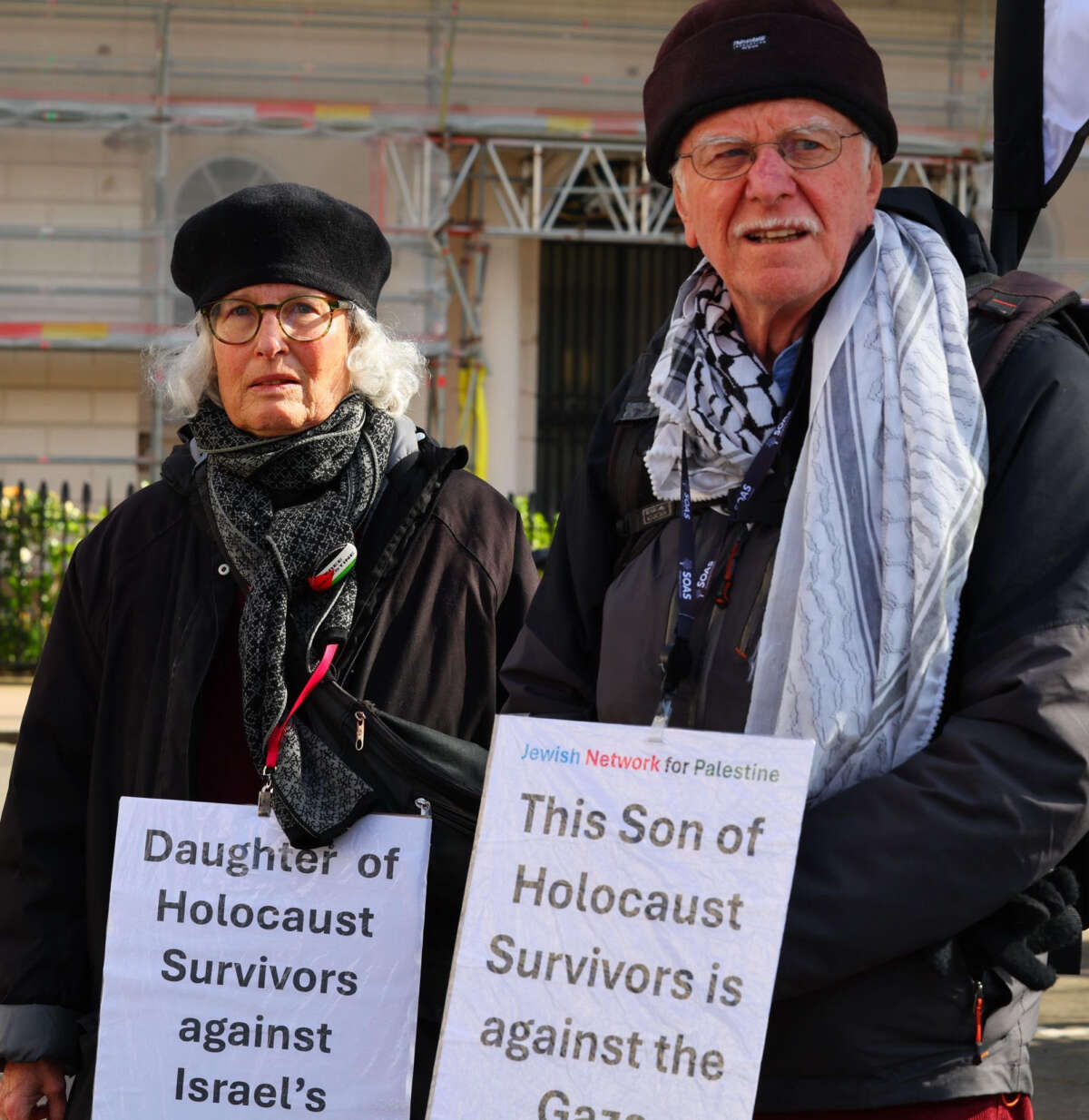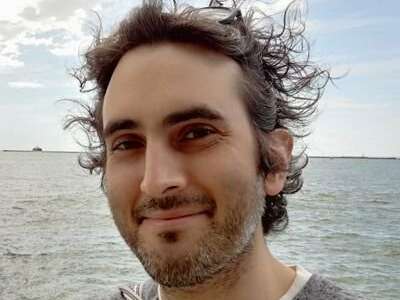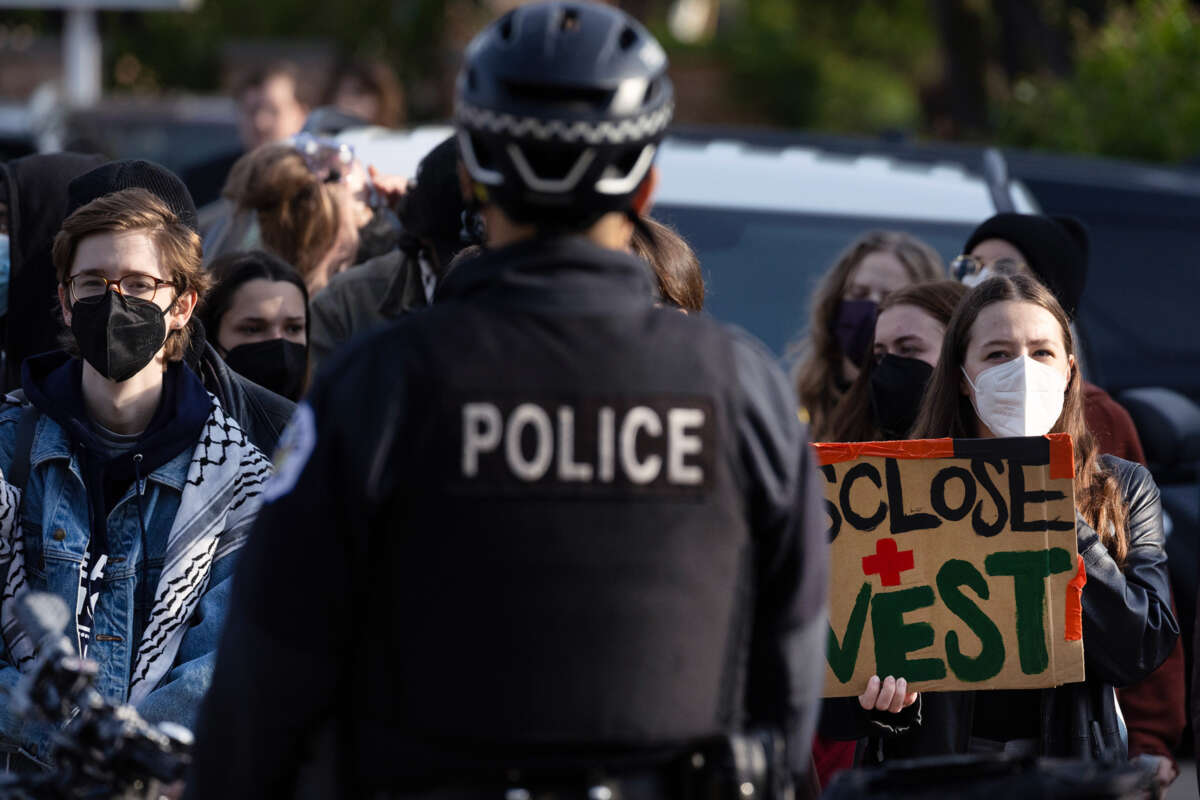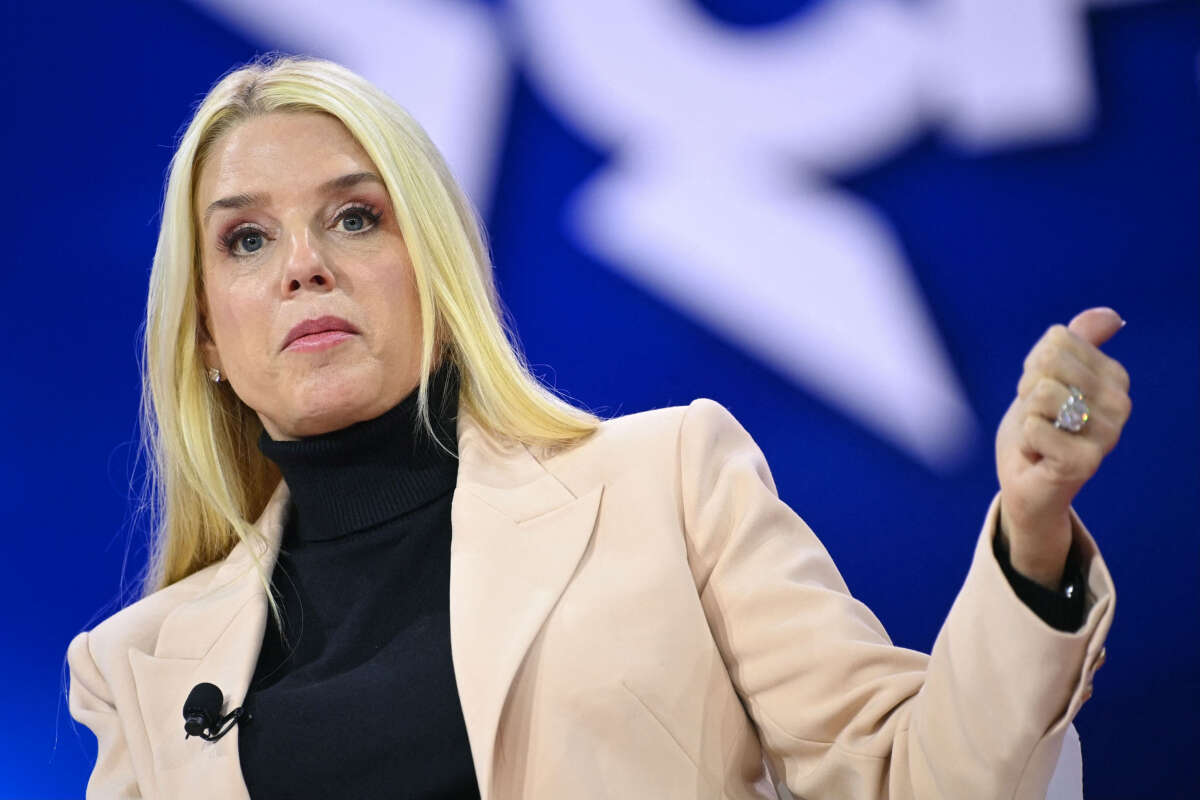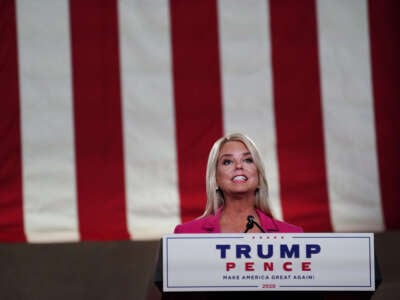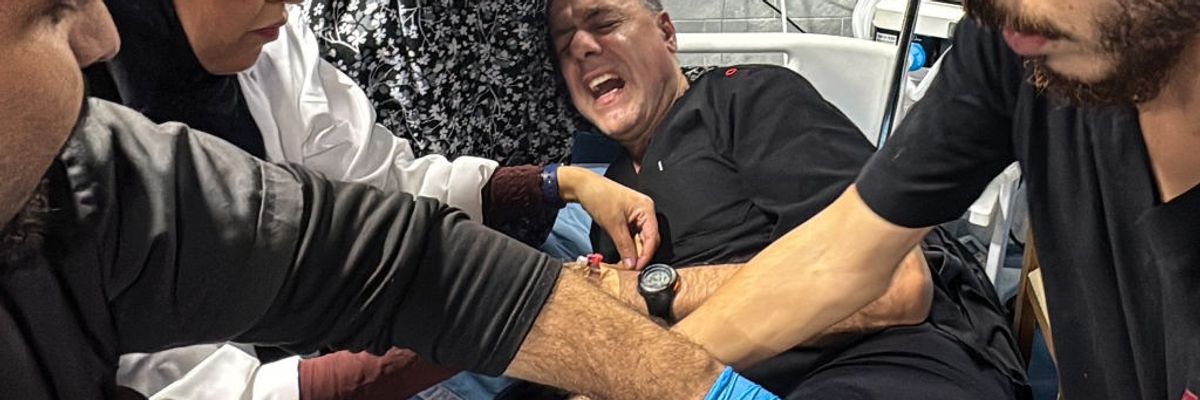Matthew Chapman
November 25, 2024
RAW STORY

Photo: Rich Koele/Shutterstock
With Donald Trump making headway with some Democratic-leaning voting blocs in the 2024 election, and with President Joe Biden's widespread implementation of pro-labor policies largely going unrewarded at the ballot box, the progressive wing of the Democratic Party is eyeing a new strategy to fight back for the coming years of the second Trump presidency.
According to Politico, their strategy is simple: offer Trump a hand and force him to keep his promises to workers — or expose him as a fraud.
Already, according to the report, progressive Democrats are laying the groundwork for this strategy, with Congressional Progressive Caucus chair Pramila Jayapal (D-WA) saying she'll work with Trump if he pursues antitrust enforcement, and Sen. Elizabeth Warren (D-MA) saying "bring it on" if Trump wants to follow through on a campaign pledge to cap credit card interest rates at 10 percent. She added that if he "refuses to follow through on the campaign promises that would help working people, then he should be held accountable.”
One Congressional progressive aide told Politico: “For the few policy proposals that we think will help the working class, capping credit card interest rates being one of them, we’ll say, ‘Put up or shut up.’ Because if he does, it’s a great win for millions of people across this country. And if he doesn’t, it exposes him as a fraud that he is.”
Progressives have no illusions, however, that they'll be able to work with Trump on a lot of his agenda, or even most of it, when push comes to shove. Warren told Politico, “There’ll be places where resistance is appropriate."
"For example, if Trump follows his V.P. JD Vance in trying to ban access to abortion nationwide through the FDA, there will be massive resistance," Warren said." If Trump follows through on his promises for more tax cuts for billionaires and billionaire corporations, we’re going to be in that fight all the way.”
Trump has put forward other policies ostensibly about protecting workers, some of which Vice President Kamala Harris even emulated on the campaign trail, including eliminating taxes on tips — although some experts are highly skeptical of those proposals.

Photo: Rich Koele/Shutterstock
With Donald Trump making headway with some Democratic-leaning voting blocs in the 2024 election, and with President Joe Biden's widespread implementation of pro-labor policies largely going unrewarded at the ballot box, the progressive wing of the Democratic Party is eyeing a new strategy to fight back for the coming years of the second Trump presidency.
According to Politico, their strategy is simple: offer Trump a hand and force him to keep his promises to workers — or expose him as a fraud.
Already, according to the report, progressive Democrats are laying the groundwork for this strategy, with Congressional Progressive Caucus chair Pramila Jayapal (D-WA) saying she'll work with Trump if he pursues antitrust enforcement, and Sen. Elizabeth Warren (D-MA) saying "bring it on" if Trump wants to follow through on a campaign pledge to cap credit card interest rates at 10 percent. She added that if he "refuses to follow through on the campaign promises that would help working people, then he should be held accountable.”
One Congressional progressive aide told Politico: “For the few policy proposals that we think will help the working class, capping credit card interest rates being one of them, we’ll say, ‘Put up or shut up.’ Because if he does, it’s a great win for millions of people across this country. And if he doesn’t, it exposes him as a fraud that he is.”
Progressives have no illusions, however, that they'll be able to work with Trump on a lot of his agenda, or even most of it, when push comes to shove. Warren told Politico, “There’ll be places where resistance is appropriate."
"For example, if Trump follows his V.P. JD Vance in trying to ban access to abortion nationwide through the FDA, there will be massive resistance," Warren said." If Trump follows through on his promises for more tax cuts for billionaires and billionaire corporations, we’re going to be in that fight all the way.”
Trump has put forward other policies ostensibly about protecting workers, some of which Vice President Kamala Harris even emulated on the campaign trail, including eliminating taxes on tips — although some experts are highly skeptical of those proposals.
What will Trump and GOP congress do to the Consumer Financial Protection Bureau?
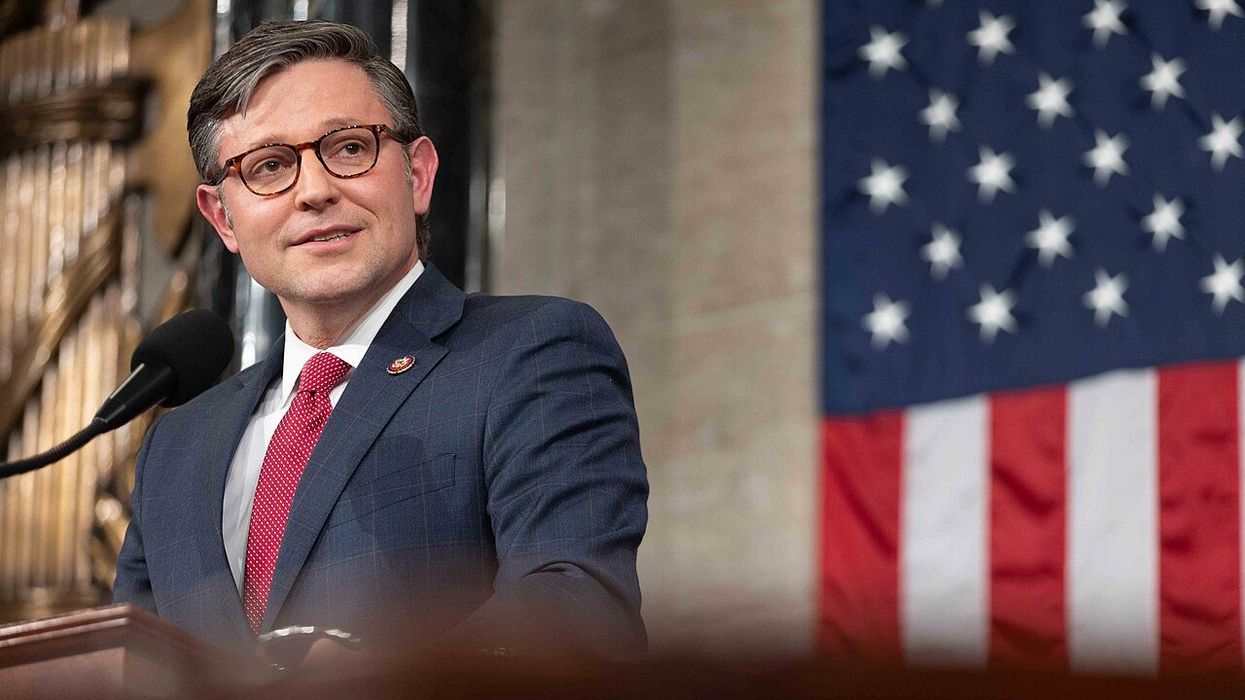
House Speaker Mike Johnson in October 2023 (Creative Commons)
Mike Johnson suffers setback when 19 Republicans block vote on new funding bill
November 25, 2024
COMMON DREAMS
Just hours after U.S. President Donald Trumpnamed a labor secretary nominee seen by some union leaders and advocates as genuinely pro-worker, The Washington Post on Saturday detailed what the incoming administration and Republican Congress have planned for a federal agency designed to protect everyday Americans from corporate abuse.
Initially proposed by Sen. Elizabeth Warren (D-Mass.) while she was still a Harvard Law School professor, the Consumer Financial Protection Bureau (CFPB) was created by the Dodd-Frank Wall Street Reform and Consumer Protection Act, which Congress passed in response to the 2007-08 financial crisis.
The first Trump administration was accused of "gutting the CFPB and corrupting its mission." However, as the Post noted, "its current Democratic leader, Rohit Chopra, has been aggressive" in his fights for consumers, working to get medical debt off credit reports and crack down on "junk fees" for everything from bank account overdrafts and credit cards to paycheck advance products—efforts that have drawn fierce challenges from the financial industry.
"Working- and middle-class people who voted for Trump did so for many reasons, but you'd be hard-pressed to find any who did so because they want higher overdraft fees."
Chopra, an appointee of outgoing President Joe Biden, isn't expected to stay at the CFPB, but Trump's recent win hasn't yet halted bold action at the agency. On Thursday, it announced plans "to supervise the largest nonbank companies offering digital funds transfer and payment wallet apps," which is set to impact Amazon, Apple, Block, Google, PayPal, Venmo, and Zelle, unless the Trump administration shifts course.
The Post reported that Republican leaders "intend to use control of the House, Senate, and White House next year to impose new restrictions on the agency, in some cases permanently," and "early discussions align the GOP with banks, credit card companies, mortgage lenders, and other large financial institutions."
According to the newspaper:
"There will be a pretty significant change from the direction the agency has been going in, and I think in a positive way," predicted Kathy Kraninger, who led the CFPB during Trump's first term. She now serves as chief executive of the Florida Bankers Association, a lobbying group whose board of directors includes top executives from Bank of America, JPMorgan Chase, PNC, and Truist. Aides on Trump's transition team have started considering candidates to lead the CFPB who are expected to ease its oversight of banks, lenders, and tech giants. The early short list includes Brian Johnson, a former agency official; Keith Noreika, a banking consultant and former regulator; and Todd Zywicki, a professor at George Mason University's law school who has previously advised the bureau, according to four people familiar with the matter.
"Of course Trumpers want to dismantle the only agency formed in decades dedicated to giving consumers a fair shake in a predatory economy," Katrina vanden Heuvel, The Nation's editorial director and publisher, said in response to the reporting—which came just a day after Forbes similarly previewed "big changes coming to Elizabeth Warren's CFPB" when Trump returns.
"The number of CFPB regulatory advisories and enforcement actions will likely shrink" and "bank mergers and acquisitions could see a boost too," Forbes highlighted. "Even more noteworthy, the CFPB's funding structure could be at increased risk," with some congressional Republicans considering the reconciliation process as a path to forcing changes, following the U.S. Supreme Court's May decision that allowed the watchdog to keep drawing money from the earnings of the Federal Reserve System.
"Changing the CFPB's funding structure would be an uphill battle since it would be perceived by many as an attempt to take the bureau’s budget to zero," the magazine noted. "But the concept 'has been on every wish list I've seen from House Republicans for the last 10 years or more since its creation,' says a former Capitol Hill staffer who has worked with the House Financial Services Committee."
Warren, who won a third term in the Senate earlier this month, is optimistic about the agency's survival. "The CFPB is here to stay," she told the Post. "So I get there's big talk, but the laws supporting the CFPB are strong, and support across this nation from Democrats, Republicans, and people who don't pay any attention at all to politics, is also strong."
The senator's comments about the CFPB's popularity are backed up by polling conducted last weekend and released Thursday by Data for Progress. Although the progressive firm found that a plurality of voters (48%) lacked an initial opinion of the agency, they expressed support when introduced to major moves during the Biden administration.
"More than 8 in 10 voters support the CFPB's actions to protect Medicare recipients from illegal and inaccurate bills (88%), crack down on illegal medical debt collection practices like misrepresenting consumers' rights and double-dipping on services already covered by insurance (86%), publish a consumer guide informing consumers of the steps they can take if they receive collection notices for medical bills (84%), and propose a rule to ban medical bills from people’s credit reports (81%)," the firm said.
Data for Progress also found that voters back agency actions to "require that companies update any risky data collection practices (85%), rule that banks and other providers must make personal financial data available without junk fees to consumers (85%), confront banks for illegal mortgage lending discrimination against minority neighborhoods (83%), and state that third parties cannot collect, use, or retain data to advance their own commercial interests through targeted or behavioral advertising (80%)."
After learning about the watchdog's recent moves, 75% of voters across the political spectrum said they approve of the CFPB.
The polling came out the same day Warren addressed Trump's campaigning on a 10% cap for credit card interest rates.
"I can't imagine that President Trump didn't mean every single thing he said during the campaign," Warren told reporters. She later added on social media: "If Donald Trump really wants to take on the credit card industry, count me in. The CFPB will back him up."
While Trump's latest electoral success was thanks in part to winning over key numbers of working-class voters, the president-elect has spent the post-election period filling key roles in his next administration with billionaires and loyalists, fueling expectations that his return to the White House—with a Republican-controlled Congress—will largely serve ultrarich people and corporations, reminiscent of his first term.
The recent reporting on the CFPB has further solidified those expectations. In a snarky social media post, Aaron Sojourner, a labor economist and senior researcher at the W. E. Upjohn Institute for Employment Research who served on the Council of Economic Advisers (CEA) during the Trump and Obama administrations, wrote: "#priorities Bringing back junk fees."
Joshua Smith, budget policy director for the Democrat-run Senate Budget Committee, said that "working- and middle-class people who voted for Trump did so for many reasons, but you'd be hard-pressed to find any who did so because they want higher overdraft fees."
Just hours after U.S. President Donald Trumpnamed a labor secretary nominee seen by some union leaders and advocates as genuinely pro-worker, The Washington Post on Saturday detailed what the incoming administration and Republican Congress have planned for a federal agency designed to protect everyday Americans from corporate abuse.
Initially proposed by Sen. Elizabeth Warren (D-Mass.) while she was still a Harvard Law School professor, the Consumer Financial Protection Bureau (CFPB) was created by the Dodd-Frank Wall Street Reform and Consumer Protection Act, which Congress passed in response to the 2007-08 financial crisis.
The first Trump administration was accused of "gutting the CFPB and corrupting its mission." However, as the Post noted, "its current Democratic leader, Rohit Chopra, has been aggressive" in his fights for consumers, working to get medical debt off credit reports and crack down on "junk fees" for everything from bank account overdrafts and credit cards to paycheck advance products—efforts that have drawn fierce challenges from the financial industry.
"Working- and middle-class people who voted for Trump did so for many reasons, but you'd be hard-pressed to find any who did so because they want higher overdraft fees."
Chopra, an appointee of outgoing President Joe Biden, isn't expected to stay at the CFPB, but Trump's recent win hasn't yet halted bold action at the agency. On Thursday, it announced plans "to supervise the largest nonbank companies offering digital funds transfer and payment wallet apps," which is set to impact Amazon, Apple, Block, Google, PayPal, Venmo, and Zelle, unless the Trump administration shifts course.
The Post reported that Republican leaders "intend to use control of the House, Senate, and White House next year to impose new restrictions on the agency, in some cases permanently," and "early discussions align the GOP with banks, credit card companies, mortgage lenders, and other large financial institutions."
According to the newspaper:
"There will be a pretty significant change from the direction the agency has been going in, and I think in a positive way," predicted Kathy Kraninger, who led the CFPB during Trump's first term. She now serves as chief executive of the Florida Bankers Association, a lobbying group whose board of directors includes top executives from Bank of America, JPMorgan Chase, PNC, and Truist. Aides on Trump's transition team have started considering candidates to lead the CFPB who are expected to ease its oversight of banks, lenders, and tech giants. The early short list includes Brian Johnson, a former agency official; Keith Noreika, a banking consultant and former regulator; and Todd Zywicki, a professor at George Mason University's law school who has previously advised the bureau, according to four people familiar with the matter.
"Of course Trumpers want to dismantle the only agency formed in decades dedicated to giving consumers a fair shake in a predatory economy," Katrina vanden Heuvel, The Nation's editorial director and publisher, said in response to the reporting—which came just a day after Forbes similarly previewed "big changes coming to Elizabeth Warren's CFPB" when Trump returns.
"The number of CFPB regulatory advisories and enforcement actions will likely shrink" and "bank mergers and acquisitions could see a boost too," Forbes highlighted. "Even more noteworthy, the CFPB's funding structure could be at increased risk," with some congressional Republicans considering the reconciliation process as a path to forcing changes, following the U.S. Supreme Court's May decision that allowed the watchdog to keep drawing money from the earnings of the Federal Reserve System.
"Changing the CFPB's funding structure would be an uphill battle since it would be perceived by many as an attempt to take the bureau’s budget to zero," the magazine noted. "But the concept 'has been on every wish list I've seen from House Republicans for the last 10 years or more since its creation,' says a former Capitol Hill staffer who has worked with the House Financial Services Committee."
Warren, who won a third term in the Senate earlier this month, is optimistic about the agency's survival. "The CFPB is here to stay," she told the Post. "So I get there's big talk, but the laws supporting the CFPB are strong, and support across this nation from Democrats, Republicans, and people who don't pay any attention at all to politics, is also strong."
The senator's comments about the CFPB's popularity are backed up by polling conducted last weekend and released Thursday by Data for Progress. Although the progressive firm found that a plurality of voters (48%) lacked an initial opinion of the agency, they expressed support when introduced to major moves during the Biden administration.
"More than 8 in 10 voters support the CFPB's actions to protect Medicare recipients from illegal and inaccurate bills (88%), crack down on illegal medical debt collection practices like misrepresenting consumers' rights and double-dipping on services already covered by insurance (86%), publish a consumer guide informing consumers of the steps they can take if they receive collection notices for medical bills (84%), and propose a rule to ban medical bills from people’s credit reports (81%)," the firm said.
Data for Progress also found that voters back agency actions to "require that companies update any risky data collection practices (85%), rule that banks and other providers must make personal financial data available without junk fees to consumers (85%), confront banks for illegal mortgage lending discrimination against minority neighborhoods (83%), and state that third parties cannot collect, use, or retain data to advance their own commercial interests through targeted or behavioral advertising (80%)."
After learning about the watchdog's recent moves, 75% of voters across the political spectrum said they approve of the CFPB.
The polling came out the same day Warren addressed Trump's campaigning on a 10% cap for credit card interest rates.
"I can't imagine that President Trump didn't mean every single thing he said during the campaign," Warren told reporters. She later added on social media: "If Donald Trump really wants to take on the credit card industry, count me in. The CFPB will back him up."
While Trump's latest electoral success was thanks in part to winning over key numbers of working-class voters, the president-elect has spent the post-election period filling key roles in his next administration with billionaires and loyalists, fueling expectations that his return to the White House—with a Republican-controlled Congress—will largely serve ultrarich people and corporations, reminiscent of his first term.
The recent reporting on the CFPB has further solidified those expectations. In a snarky social media post, Aaron Sojourner, a labor economist and senior researcher at the W. E. Upjohn Institute for Employment Research who served on the Council of Economic Advisers (CEA) during the Trump and Obama administrations, wrote: "#priorities Bringing back junk fees."
Joshua Smith, budget policy director for the Democrat-run Senate Budget Committee, said that "working- and middle-class people who voted for Trump did so for many reasons, but you'd be hard-pressed to find any who did so because they want higher overdraft fees."
Matthew Chapman
November 25, 2024
RAW STPRU
A key economic expert laid bare the potentially devastating consequences to the U.S. economy if Donald Trump tries to unwind President Joe Biden's legislative accomplishments when he takes office.
"The White House announced today that the infrastructure bills passed during the Biden administration have spurred over $1 trillion in private sector investments," posted Steven Rattner, an MSNBC economic analyst and former adviser to the Obama administration on rescuing the auto industry. "If Trump tries to repeal these laws, the consequences would be costly."
Rattner referenced a Monday announcement from the White House that discussed the impact of a pair of bipartisan bills signed by Biden, the Infrastructure Investment and Jobs Act and the CHIPS and Science Act, along with the Democratic-backed health care and energy reform bill known as the Inflation Reduction Act.
Together, said the statement, all of this legislation "has helped attract over $1 trillion in announced private-sector investments. These investments in industries of the future are ensuring the future is made in America, by American workers. And they’re creating opportunities in communities too often left behind."
While Trump hasn't outright said he will repeal any of these laws, and it's unclear whether he'd have the votes to do so, he may be in a position to at least hobble their implementation; his Treasury Secretary pick, Scott Bessent, has called the IRA a "doomsday machine for the budget" and may have some power to rewrite regulations around the law's tax giveaways for clean energy development.
All of this comes as economists sound the alarm over Trump's plan to enact mass deportation and draconian new tariffs across consumer markets, raising fears that higher inflation, only recently stabilized, could come roaring back.
A key economic expert laid bare the potentially devastating consequences to the U.S. economy if Donald Trump tries to unwind President Joe Biden's legislative accomplishments when he takes office.
"The White House announced today that the infrastructure bills passed during the Biden administration have spurred over $1 trillion in private sector investments," posted Steven Rattner, an MSNBC economic analyst and former adviser to the Obama administration on rescuing the auto industry. "If Trump tries to repeal these laws, the consequences would be costly."
Rattner referenced a Monday announcement from the White House that discussed the impact of a pair of bipartisan bills signed by Biden, the Infrastructure Investment and Jobs Act and the CHIPS and Science Act, along with the Democratic-backed health care and energy reform bill known as the Inflation Reduction Act.
Together, said the statement, all of this legislation "has helped attract over $1 trillion in announced private-sector investments. These investments in industries of the future are ensuring the future is made in America, by American workers. And they’re creating opportunities in communities too often left behind."
While Trump hasn't outright said he will repeal any of these laws, and it's unclear whether he'd have the votes to do so, he may be in a position to at least hobble their implementation; his Treasury Secretary pick, Scott Bessent, has called the IRA a "doomsday machine for the budget" and may have some power to rewrite regulations around the law's tax giveaways for clean energy development.
All of this comes as economists sound the alarm over Trump's plan to enact mass deportation and draconian new tariffs across consumer markets, raising fears that higher inflation, only recently stabilized, could come roaring back.
